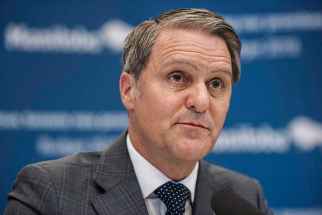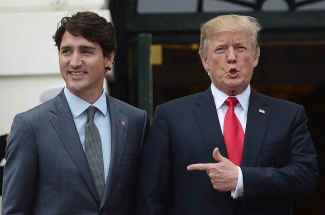Manitoba in peacemaking role as other provinces seek equalization changes from Ottawa
Read this article for free:
or
Already have an account? Log in here »
To continue reading, please subscribe:
Monthly Digital Subscription
$0 for the first 4 weeks*
- Enjoy unlimited reading on winnipegfreepress.com
- Read the E-Edition, our digital replica newspaper
- Access News Break, our award-winning app
- Play interactive puzzles
*No charge for 4 weeks then price increases to the regular rate of $19.00 plus GST every four weeks. Offer available to new and qualified returning subscribers only. Cancel any time.
Monthly Digital Subscription
$4.75/week*
- Enjoy unlimited reading on winnipegfreepress.com
- Read the E-Edition, our digital replica newspaper
- Access News Break, our award-winning app
- Play interactive puzzles
*Billed as $19 plus GST every four weeks. Cancel any time.
To continue reading, please subscribe:
Add Free Press access to your Brandon Sun subscription for only an additional
$1 for the first 4 weeks*
*Your next subscription payment will increase by $1.00 and you will be charged $16.99 plus GST for four weeks. After four weeks, your payment will increase to $23.99 plus GST every four weeks.
Read unlimited articles for free today:
or
Already have an account? Log in here »
Hey there, time traveller!
This article was published 25/06/2018 (2729 days ago), so information in it may no longer be current.
OTTAWA — Manitoba is trying to quell an uprising by the other Prairie provinces hoping to change the formula for equalization payments when finance ministers gather Tuesday in Ottawa.
Last week, Parliament passed the Liberals’ budget bill, which includes a clause committing Ottawa to the existing formula for equalization payments over the next five years.
The federal government distributes $19 billion among the provinces, based on both population and fiscal capacity. It allots federal money to provinces with less ability to generate tax revenue than others, in order to ensure comparable living standards across the country.
That’s meant oil-rich Prairie provinces, alongside Newfoundland and Labrador, haven’t received those payments in recent years, while Quebec and the Maritimes get the lion’s share of the transfers.
Alberta Finance Minister Joe Ceci and Saskatchewan Premier Scott Moe both say their provinces ought to be receiving equalization, because the resource sector’s decline has hit them hard — though economists note that both remain Canada’s two strongest economies, even through the downturn.
In the spring, the Liberals informed both politicians that the plan was to stick with the existing formula from 2019 to 2024. But the actual wording in the 556-page budget bill went largely ignored in Parliament and by media.
Moe wrote on Twitter recently that the formula was “not equitable or fair to all provinces in Canada.” The Saskatchewan premier recently proposed an alternative formula that would see half the transfer allotted based on the current formula, and the rest transferred based solely on population.
This conversation around Equalization isn’t over. Saskatchewan will continue to press for needed changes.
The program is not equitable or fair to all provinces in Canada.
We need to #FixEqualization. pic.twitter.com/rBuJsewwO1
— Scott Moe (@PremierScottMoe) June 22, 2018
Both provinces plan to raise the issue Tuesday when federal Finance Minister Bill Morneau welcomes his provincial counterparts.
But Manitoba Finance Minister Cameron Friesen said it’s not worth Ottawa considering the proposal, after what he said were five years of talks to carve out possible changes to the program.
Friesen wants to clear smoke around pot tax
OTTAWA — On Tuesday, federal Finance Minister Bill Morneau wants to speak with his provincial counterparts about the United States’ steel tariffs, and the ongoing re-negotiation of the North American Free Trade Agreement.
OTTAWA — On Tuesday, federal Finance Minister Bill Morneau wants to speak with his provincial counterparts about the United States’ steel tariffs, and the ongoing re-negotiation of the North American Free Trade Agreement.
But Manitoba Finance Minister Cameron Friesen hopes to also seek clarity over the excise tax on cannabis, as recreational marijuana will become legal Oct. 17.
In March, Manitoba agreed to formula Ottawa had proposed three months earlier, where 25 per cent of the sin tax on cannabis goes to the federal government until it hits an annual $100-million cap, and the rest going to the province where the product is sold.
Provincial officials say Manitoba needs to finalize the wording around that arrangement.
The formula is based on a tax that would be $1 per gram, or 10 per cent of a cannabis product, whichever is higher. The province might be seeking clarity on how to define those two categories, and it’s possible the province may seek a specific answer to whether municipalities will have a prescribed portion of the excise tax.
“The recent proposal by Saskatchewan falls clearly outside” those talks, Friesen wrote in a statement Monday. “This stage of the process is not the time to bring forward such a fundamental change in direction.”
Friesen said that when finance ministers last met in December, Ottawa presented “several key recommendations for improvement… some of which are already being implemented, and one which requires fine tuning,” he wrote. His office did not elaborate on what was on the table.
Yet economists have noted that the formula is pegged to Canada’s GDP, which means that when the economy grows more than expected, Ottawa gives out more money to Canadians in all provinces, including those that wouldn’t otherwise receive any equalization money.
!function(e,t,n,s){var i=”InfogramEmbeds”,o=e.getElementsByTagName(t)[0],d=/^http:/.test(e.location)?”http:”:”https:”;if(/^/{2}/.test(s)&&(s=d+s),window[i]&&window[i].initialized)window[i].process&&window[i].process();else if(!e.getElementById(n)){var a=e.createElement(t);a.async=1,a.id=n,a.src=s,o.parentNode.insertBefore(a,o)}}(document,”script”,”infogram-async”,”https://e.infogram.com/js/dist/embed-loader-min.js”);
The current formula also appears to treat revenue from carbon taxes differently based on whether it’s a province or Ottawa collecting the revenue. That would have implications for Manitoba, because the federal government intends to collect a top-up on the province’s flat $25-per-tonne levy starting in 2020; Ottawa plans gradual increases over the coming five years.
In any case, Manitoba is expected to get a diminishing share of equalization payments during this century, due to its demographics and fiscal capacity. A March report by the Parliamentary Budget Officer found that Manitoba’s growing, younger population will likely wean the province off eligibility for the transfer, but a comparatively high deficit and taxes leave less room for the province to make up the shortfall.









